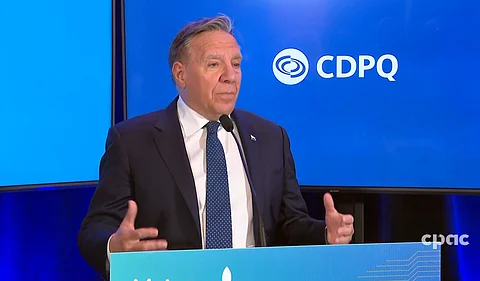

A new report from an activist climate finance watchdog group is pushing back against renewed political interest in natural gas export infrastructure in Quebec, declaring that “the ship has sailed” on LNG megaprojects on Canada’s East Coast.
The report, “That Ship Has Sailed: The Missing Business Case for LNG Exports via Canada’s East Coast,” by Investors for Paris Compliance argues that proposed projects like GNL Québec and Energy East are economically unviable, environmentally damaging, and out of step with global energy trends.
The publication lands just as Quebec Premier François Legault has signalled a softening stance on fossil fuel infrastructure, and as Prime Minister Mark Carney promotes a vision of Canada as an “energy superpower” that includes both clean energy and natural gas development.
The report’s timing also intersects with growing trade tensions between Canada and the United States, which have stoked interest in energy security and diversification — particularly in Quebec and Atlantic Canada.
Despite Legault’s earlier opposition to such projects, he now says he is open to reconsidering pipelines and LNG terminals if they meet the threshold of “social acceptability.”
“I’m open to these projects, provided there’s social acceptability,” Legault stated during a recent federal-provincial summit in Ottawa.
Public opinion appears to be shifting in his favor. A recent Léger poll showed that a majority of Quebecers now support reviving the Energy East pipeline, with support even stronger outside the province.
Meanwhile, Prime Minister Carney is seeking to fast-track energy approvals through a proposed centralized federal permitting agency.
“Canada will lead in all forms of energy — hydro, hydrogen, wind, solar, nuclear, and natural gas,” Carney said during the election. “We are going to aggressively develop projects that are in the national interest… all while reducing emissions,” Carney announced.
Yet critics argue those moves risk locking Canada into expensive, outdated infrastructure at a time when they insist global LNG demand is plateauing and long-term contracts are increasingly difficult to secure.
The Investors for Paris report warns that global markets have shifted decisively away from new LNG buildouts, and that relying on US demand is “risky” given its own production growth and shifting political winds.
Within the Liberal Party, Carney faces unease from environmentally focused MPs and several Quebec caucus members who are wary of reintroducing pipeline debates that were long thought politically settled.
Opposition parties, including the Bloc Québécois and the Greens, have condemned any potential federal support for reviving the GNL Québec project.
For now, the energy debate in Canada is reigniting with a changed geopolitical landscape, a new federal leadership, and a Quebec government inching away from firm opposition.
But as the new report makes clear, any path forward will face scrutiny not only on environmental grounds but also on questions of long-term economic viability.
In 2021, the Quebec government rejected the GNL Québec project, citing potential increases in greenhouse gas emissions and threats to local wildlife.
As Canada navigates its energy future, the balancing act between economic development, environmental stewardship, and public opinion will be crucial in determining the success of these renewed initiatives.
“Savvy investors would do well to look beyond fleeting political cycles and put their resources into sectors with a sound business case, and where Canada and Quebec have a competitive advantage,” the report reads.
“Clean energy, critical minterals, and high-speed rail are just a few examples.”
